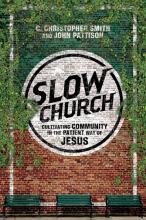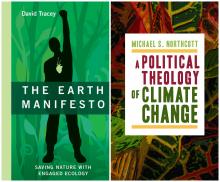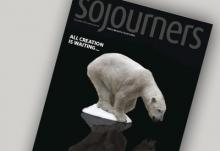Ecology

Even in the midst of our lands groaning for their future restoration (Romans 8:22), the body of Christ dismantles the colonial systems that have privatized God’s creation. For in Christ, land and resources are not meant to be segregated but rather shared through hospitality for the flourishing of local communities, especially for the vulnerable and oppressed among us (1 John 3:17-18). In this way, Christ’s body is a new ecology between all lands, nations, and peoples through a common love for each other.

Though traditionally revered in Cambodia’s majority-Buddhist society, monks today are not immune to the government’s crackdown on civil society actors. But where efforts at civic organization meet rebuke, Cambodia has seen the rise of one act of conservation — the holy ordination of trees — which originally emerged in Thailand and has risen in practice under the auspices of the Buddhist faith.

HERE’S WHAT Slow Church is not: A how-to manual with five easy steps to make your congregation more thoughtful. A celebration of how using the word “community” often on your church website will multiply your pledge and attendance numbers. An ode to really, really long worship services.
Rather, Slow Church explores being church in a way that emphasizes deep engagement in local people and places, quality over quantity, and in all things taking the long view—understanding individuals and congregations as participants in the unfolding drama of all creation. Authors C. Christopher Smith and John Pattison are self-proclaimed “amateurs,” insofar as they are writers-editors and lay leaders, not professional pastors, theologians, or congregational consultants. But this book is richly informed by their experience in their own church contexts (Englewood Christian Church in a gritty neighborhood in Indianapolis for Smith; an evangelical Quaker meeting in small-town Oregon for Pattison), conversations with other church communities, and close reading of classic and contemporary literature on culture, Christian community, scripture, and spirituality

CLIMATE CHANGE and its accompanying issues are mammoth topics. David Tracey’s The Earth Manifesto and Michael S. Northcott’s A Political Theology of Climate Change are ambitious and sound theoretical and practical treatments.
With different faith backgrounds, each brings to the task the urgency of the moment. Tracey is a Vancouver urban ecologist, a fiction and nonfiction writer, a writing teacher, and an avid housing co-op dweller with his wife and two school-age children. He has spearheaded several community garden co-ops. Northcott is a priest in the Church of England and a University of Edinburgh social ethicist who has written on understanding space and its sacred sharing, urban ministry and theology, and now this, his third book on climate change.
Tracey’s The Earth Manifesto dives right into the ecological mandates of our time and place. It gently and consistently employs an implicit Buddhist perspective to offer concise chapters—really a set of tools—to name, address, engage, and sustain a meaningful citizens’ involvement. These are expressed in two parts: three big ideas and three big steps. The ideas consist of “Nature Is Here,” “Wilderness Is Within,” and “Cities Are Alive.” Tracey’s three big steps are “groundtruthing”—engaging deeply in a place to shape one’s environmental efforts; political advocacy; and building a community to help spread a campaign for change.
Two concepts stand out vividly. Tracey’s explanation of groundtruthing conveys the need to test a theoretical perspective by getting right on the ground to verify its potential in the concrete. One intuits incarnational theology here. He also affirms the nature of engagement from its French origins to mean “someone passionately committed to a cause”: pledged, dedicated, or devoted. For me this summons the discipline of spirituality in the service of social justice.
CYNTHIA MOE-LOBEDA is a Lutheran feminist ethicist trained at Union Theological Seminary in New York who teaches Christian ethics, gender, and diversity studies at Seattle University. The author of several previous books in Christian social ethics, she has emerged as a significant voice in contemporary Christian economic, ecological, and public ethics.
The evil considered in Resisting Structural Evil is primarily the collective ecological and economic damage being done by wealthy global North folk—such as most readers of this review—through the indulgent and wasteful way of life that we have been socialized into accepting as normal despite its disastrous implications and effects. This evil is structural and driven largely by the unaccountable and nearly unlimited power of the modern corporation.
One reason our ecological and economic injustice can be labeled as evil is because it is largely hidden from our eyes—or if we see it, it is accepted as simply the way things are and always have been and always will be. So we live off the suffering of the people whose land we take or despoil, or whose livelihoods we destroy, or whose water we poison, or whose labor we exploit to get our “everyday low prices.” And we go merrily about our wealthy and comfortable way in a state of what the author describes as “moral oblivion.”
Moe-Lobeda takes the reader on a journey intended to end such moral oblivion. I find the book to be primarily an exposé of the connections between the “American way of life” and the injustices on which it is built—and which it perpetuates. Among these injustices is harm to the earth, which has both terrifying long-term implications for the livability of our planet in the future and concrete short-term costs for those invisible neighbors of ours who suffer ecological harm so that we might drink our soft drinks and get the latest electronics.
Books
Faith meets science
- Scientist Katharine Hayhoe and her spouse, evangelical pastor and writer Andrew Farley, gently and wisely respond to the concerns of those who deny the reality of climate change in A Climate for Change: Global Warming Facts for Faith-Based Decisions (FaithWords). An accessible exploration of the science behind climate change and the faith-based reasons why Christians can and must act.
- Ben Lowe, of Young Evangelicals for Climate Action, describes the rise of climate leadership on Christian college campuses in Green Revolution: Coming Together to Care for Creation (IVP Books).
- In Global Warming and the Risen LORD: Christian Discipleship and Climate Change (Evangelical Environmental Network), Jim Ball offers biblical and spiritual resources needed to meet the challenge.
- No Oil in the Lamp: Fuel, Faith and the Energy Crisis (DLT Books), by Andy Mellen and Neil Hollow, is part science manual, part Bible study and points toward a Christian theology for resource depletion and "peak oil." The unexpected foreword by the CEO of a top U.K. energy company adds depth.
- God, Creation, and Climate Change: A Catholic Response to the Environmental Crisis (Orbis Books), edited by Richard W. Miller, collects original essays by leading Catholic theologians and ethicists to give theological and biblical perspectives on our environmental crisis.
- Green Discipleship: Catholic Theological Ethics and the Environment (Anselm Academic), edited by Tobias Winright, is a compendium drawing on scholars from the fields of ecology, biology, history, and sociology, and includes study group aids. It also has the text of "If You Want to Cultivate Peace, Protect Creation," a January 2010 speech by Pope Benedict XVI, which can also be found at www.vatican.va.
- Sacred Acts: How Churches are Working to Protect Earth's Climate (New Society), by Mallory McDuff, looks at local churches' best practices to reverse climate change.
IN SPRING 1986, a group of Italian activists led by Carlo Petrini launched a protest against the opening of a McDonald’s near the famous Spanish Steps in Rome. This protest marked the origin of the Slow Food movement, which has spread over the last 26 years to more than 150 countries.
Following this Slow Food effort came a host of other Slow movements—Slow Cities, Slow Parenting, Slow Money, and more—that collectively raise opposition to the speed and industrialization of Western culture. Slow movements are beginning to recover what we have lost in our relentless pursuit of efficiency. Many Christians have been challenged by these Slow movements to consider the ways in which our faith has begun to move too fast as we make sacrifices to the gods of efficiency.
This quest has sparked a renewed interest in the joys of sharing life together in local congregations and has intensified into a growing conversation—rather than a movement—called Slow Church. Slowness itself is not a cardinal virtue of Slow Church, but rather a means of resisting the present-day powers of speed in order to be faithful church communities.
The biblical vision of God’s mission in the world is God’s reconciliation of all creation (see, for example, Colossians 1:15-23 and Isaiah 65:17-25). But too often we narrow the scope of our faith and ignore the massive damage that incurs. Some Christians reduce the faith to four easy steps to stay out of hell, others to a set of techniques for growing a large church, and still others to a political ideology (of the Right or the Left). Christianity has also been reduced by some to a feel-good spirituality that has little or no bearing on the rest of our lives or in the public square.

Church camp was in my blood, with an Episcopalian lineage that began when my grandfather helped to build and then direct Camp Bratton-Green in Mississippi. Every summer of her childhood, my mother was a camp brat, the outdoorsy, lanyard-loving equivalent of an army brat.
As a 16-year old, she met my father when he drove his family’s car from Hattiesburg, Miss., to pick up his sister Marcia from camp in Canton, Miss. And decades later, two of my siblings met their spouses at camp.
But let’s be clear: church camp in my family was more than an easy way to find a summer fling from the same denomination. While none of my crushes lasted beyond the summer, I gained a more enduring life-long commitment to God’s earth. Summer camp integrated me into a Christian community that sought to reconcile humans with creation.
President’s Obama’s delay in approving the Keystone XL Pipeline is a victory for the movement to stop it, for God’s earth, for the possibility of reversing climate change, and for saving the integrity of this administration.
A “No” to pipeline approval wasn’t really politically likely, with the likelihood of attacks on Obama by the Republicans and the labor movement of sacrificing jobs during an election year — even though the pipeline offers temporary and bad jobs.
The environmental movement is part of the Democratic President’s base, but so is labor and they are both more numerous and more effectively organized to help in presidential races.
So this delay is a victory for the possible future of a clean energy economy, which would produce many more and better jobs, while making a cleaner and more sustainable economy possible.
Today is Earth Day, an occasion for marking our responsibility to care for our world and the environment. It seems trite to have just one day to remind ourselves of the importance of this -- though the same could be (and often is) said about Father's Day, Mother's Day, Valentine's Day, Christmas, etc.
